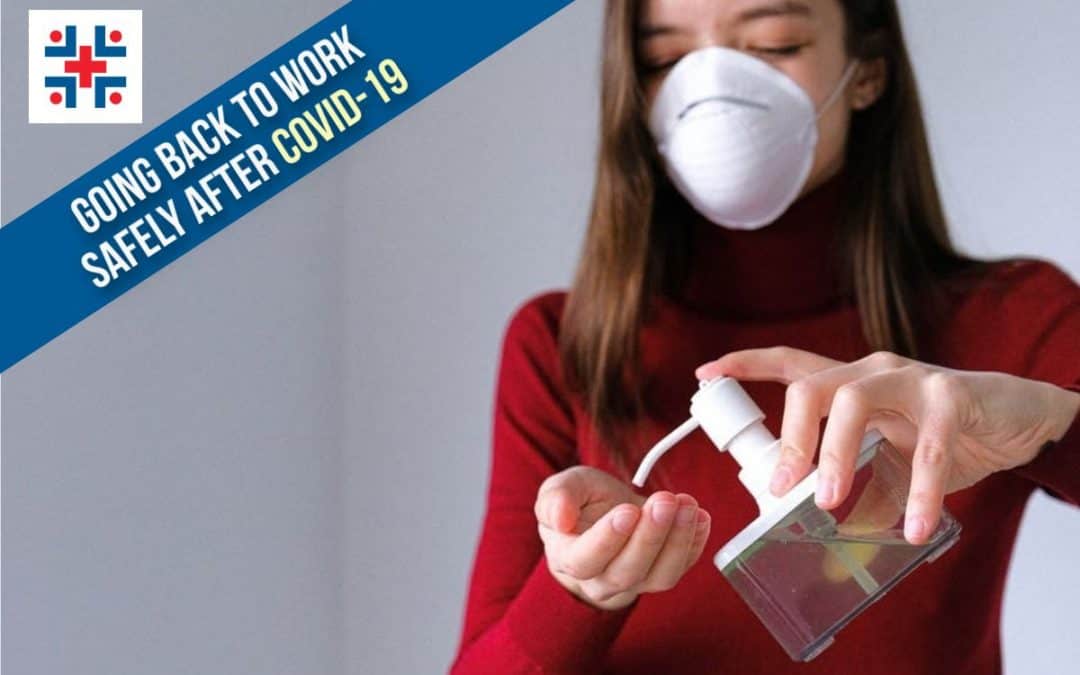The Economic Transition Team, composed of our San Antonio medical community as well as business and economic development leaders, provide a guide for best practices for going back to work safely while navigating through COVID-19. We’ve compiled the Governor’s “Open Texas” plan, organizations and experts recommendations for best practices, and checklists for industries and services reopening during the pandemic with the State of Texas minimum standard health protocols to support businesses with a safe return to work. As 90% of COVID-19 patients have underlying health conditions, we encourage regular engagement with primary care providers for those suffering through chronic conditions to utilize our direct primary care model to assist with continuity of care going forward.
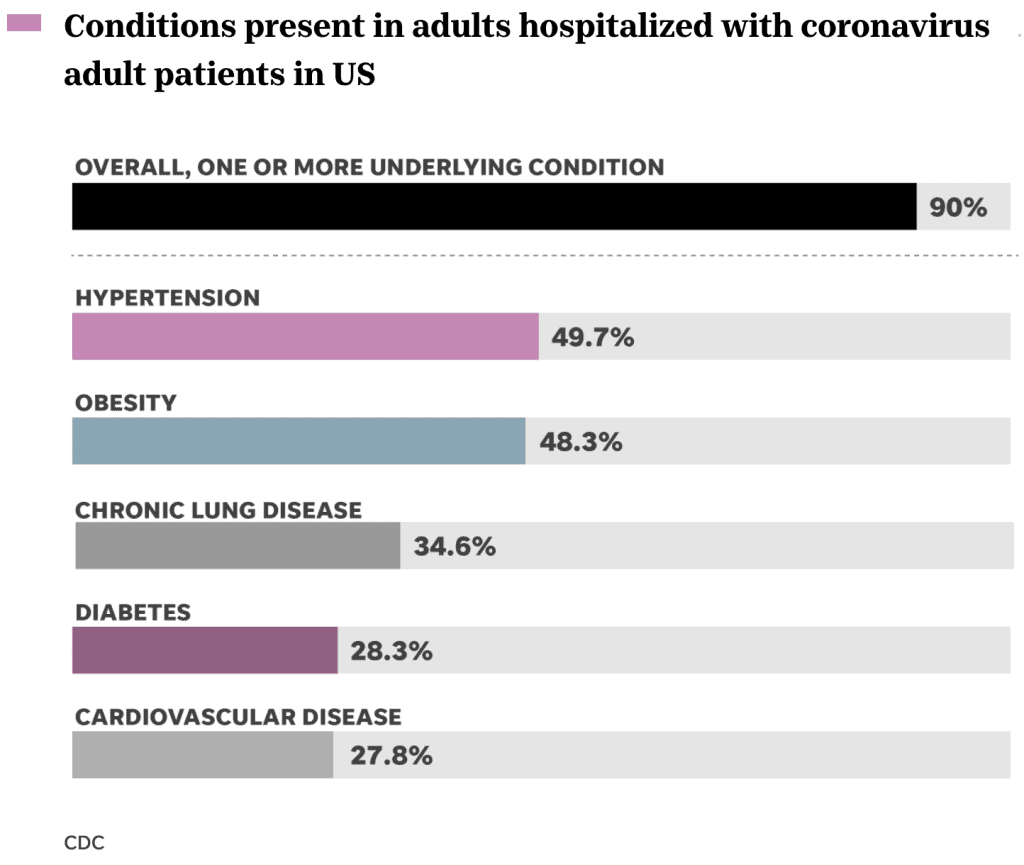
The addendum to the health report helps to mitigate risks as businesses reopen, knowing that “consumer confidence depends directly on trust in the guidance.” Direct Med Clinic’s model of Direct Primary Care embodies the proposed transparency, equity, and clear communication that is encouraged as critical and essential elements necessary to successfully reopen the economy of San Antonio.
The objectives of the Health Transition Team is to prioritize health to protect employees, customers, and visitors while also keeping in mind social inequities that will inevitably affect different communities differently with the reopening after COVID-19, which is why the guide for best practices and levels of risk have been considered by industry, with the goal to maintain flexibility accordingly.
The transition report has noted that the pandemic has highlighted how many businesses, particularly small businesses and minority-owned businesses, are forced to choose between physical and economic health. There must be extra support provided for this population group. Continuity in health care will assist businesses with this profile in keeping their workforce strong by providing the foundation to diminish the chronic conditions that already exist heavily within the community.
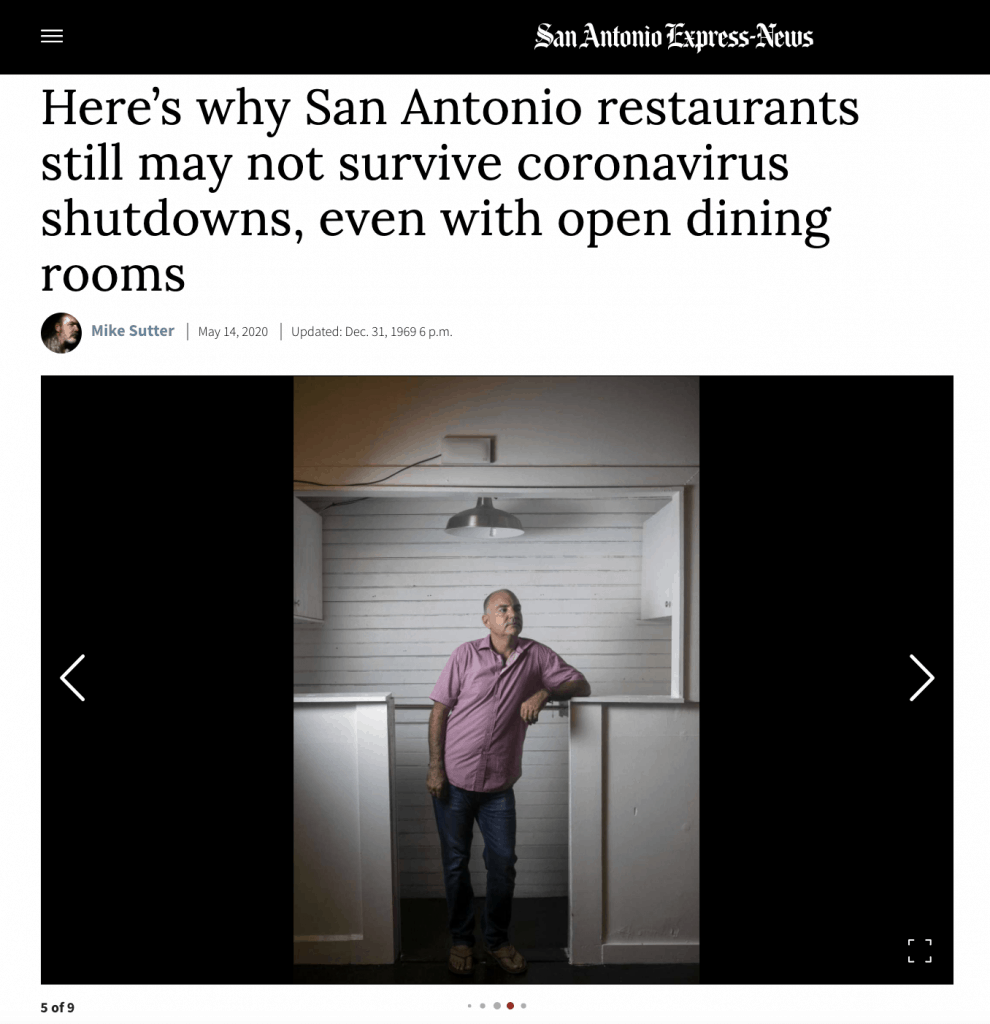
The transition report highlights that most minority businesses are unlikely to receive loans considering there is no pre-existing banking relationship in most of these communities. This means these businesses are especially at risk of being unlikely to open again after closing their doors. Considering that physical health and economic health are united, this is tragic for women, minorities, and their employees. The list of recommendations for businesses varies, however, most retain the same or similar checklists, recommendations, and the same state of Texas minimum standard health protocols to keep the safety and wellbeing of employees, one of the two largest local concerns according to the SAEDF survey. The first concern being financial security.
Direct Med Clinic is Direct, Accessible, Transparent and Affordable.
As the short term recommendations for an equitable reopening include free and low-cost telehealth, Direct Med Clinic is in a position to offer both short-term and long-term solutions for businesses and individuals who are and will be impacted by the COVID-19 pandemic during and after the reopening of Texas.
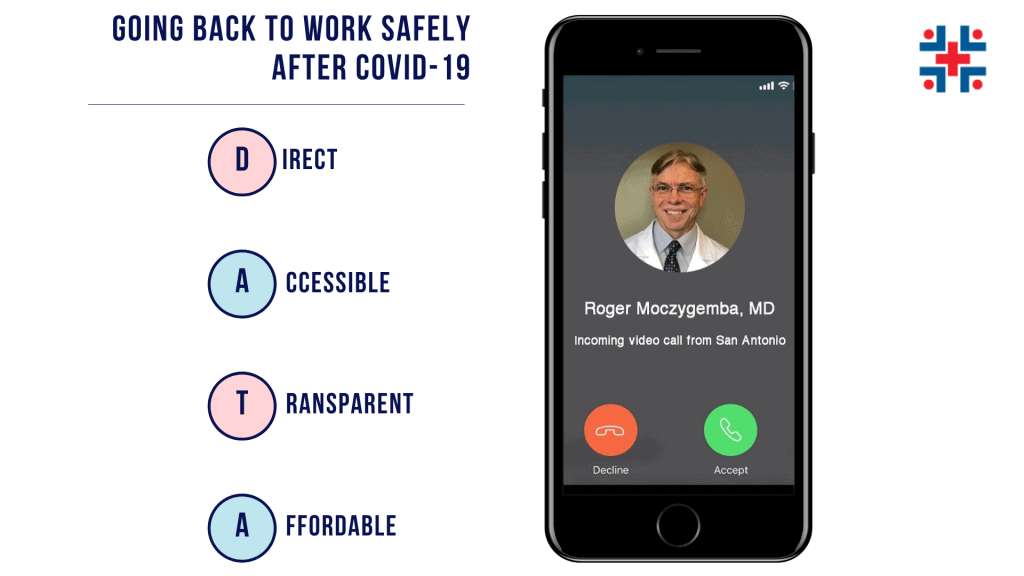
While investing in more permanent solutions for long-term recommendations include supporting local business needs through “buy-local” campaigns, for example, staying connected to telemedicine is a recommended short-term recommendation that can lead to a long-term benefit. Telemedicine is a key benefit provided by membership with Direct Med Clinic and a part of our Direct Primary Care model that does not require insurance.
Best Practices for Retail Food Stores, Restaurants, and Food Pick-Up/Delivery Services During the COVID-19 Pandemic
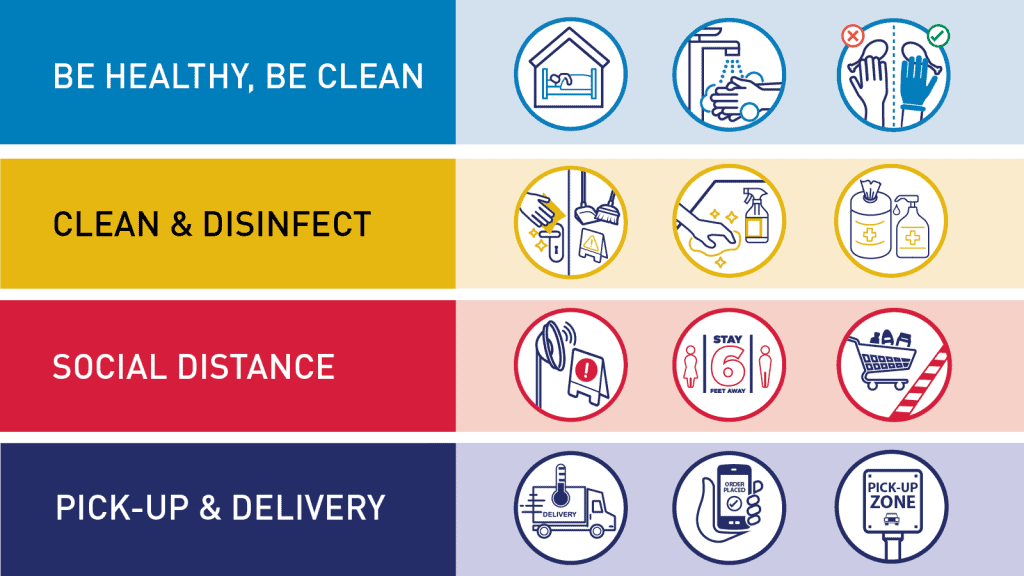
Businesses in the San Antonio community will need to restart with employee health and consumer confidence. Governor Abbott’s executive order (GA-18) outlines that many businesses may operate for service up to 25% of the total listed occupancy. Customers must feel safe and workers must be healthy or the economy will once again suffer. Implementing the strategies to keep customers feeling safe, however, requires supplies that are in such high demand that they are not always available.
RECOMMENDED RESOURCES:
- Touchless thermometers
- Face coverings (non-medical grade)
- Hand sanitizer (for employee and customer use)
- Gloves (where appropriate)
- Tape to mark physical distance between clients
- Surface cleaning products
These are the basic recommendations with other considerations per industry noted within the guidelines.
Greater San Antonio is also being called to pledge (and repeat), “Greater. SAfer. Together,” with the aim to commit to an increase in protection for employees, customers and the community for health and safety.
As Greater San Antonio business owners, we PLEDGE to:
- Use face coverings
- Practice physical distancing
- Conduct temperature checks
- Provide hand sanitizer
- Follow CDC cleaning protocols
- Implement contactless payment when possible
- General COVID-19 awareness training for employees
<<REPEAT>>
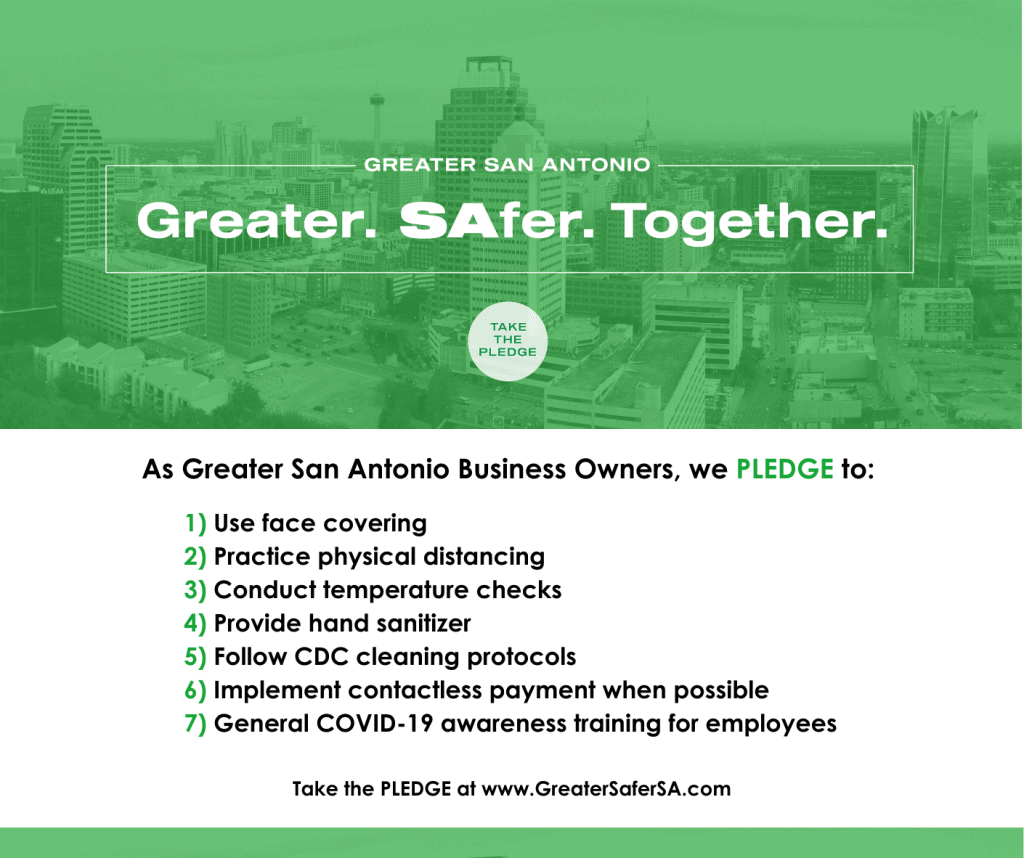
Health Protocols Going Back To Work Safely
A mnemonic to health remember the health protocols for employees is TSS.
- TRAIN
- SCREEN
- SEND

Employees need to be TRAINED on proper cleaning and disinfection, hand hygiene and coughing etiquette.
They should be SCREENED for COVID-19.
SEND employees home when symptoms worsen or become present.
Symptoms include:
- Cough
- Sore throat
- Shortness of breath or difficulty breathing
- Loss of taste or smell
- Chills
- Diarrhea
- Repeated shaking with chills
- Feeling feverish or a temperature ≥ 100ºF
- Muscle pain
- Headache
- Known close contact with a person who is lab confirmed to have COVID-19
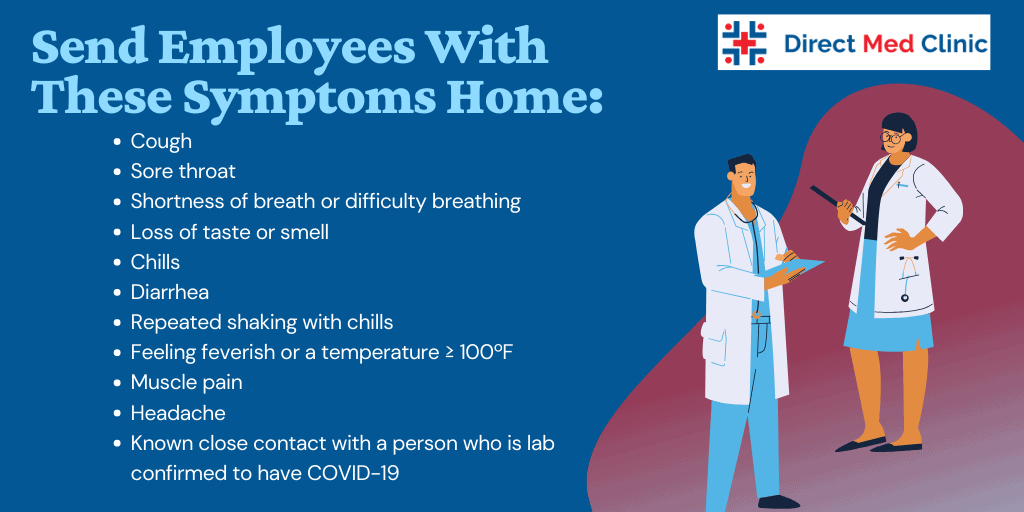
Do not allow employees with the new or worsening signs or symptoms listed above to return to work until specific criteria are met.
In the case of an employee who was diagnosed with COVID-19, the individual may return to work when all three conditions are met:
- At least 3 days (72 hours) have passed without fever and no medications to bring the fever down.
- The employee is no longer coughing or have shortness of breath showing improvement in respiration.
- At least 7 days have passed since symptoms first appeared
If the employee is not officially diagnosed with COVID-19 but assumed to have COVID-19, the employee may return to work after completing the same three-step process above.
If the employee has symptoms that could be COVID-19 and wishes to return to work before completing the above self-isolation period, the individual must obtain a doctor’s note clearing the individual for return based on an alternative diagnosis.
Do not allow an employee with known close contact to a person who is lab-confirmed to have COVID19 to return to work until the end of the 14-day self-quarantine period from the last date of exposure (with an exception granted for healthcare workers and critical infrastructure workers).
Have employees wash or sanitize their hands upon entering the restaurant, and between interactions with customers. Have employees maintain at least 6 feet of separation from other individuals. If such distancing is not feasible, measures such as face-covering, hand hygiene, cough etiquette, cleanliness, and sanitation should be rigorously practiced.
Consistent with the actions taken by many restaurants across the state, consider having all employees wear cloth face coverings (over the nose and mouth). If available, employees should consider wearing non-medical grade face masks.

